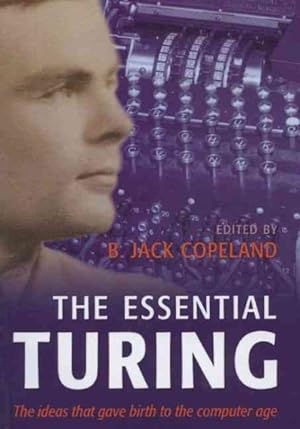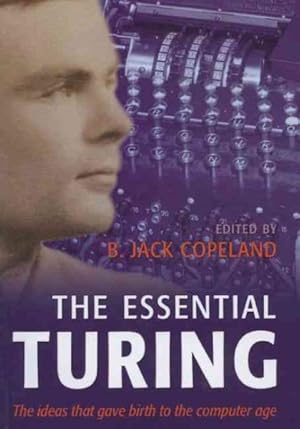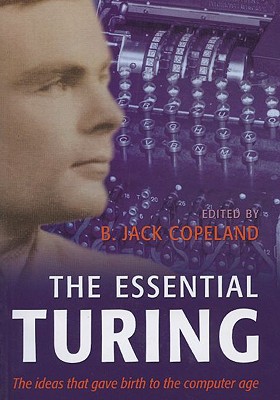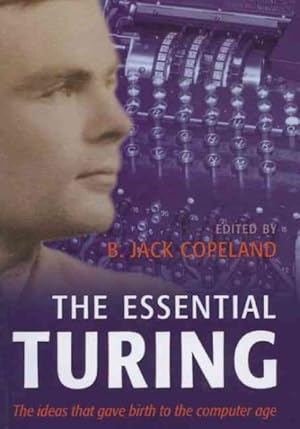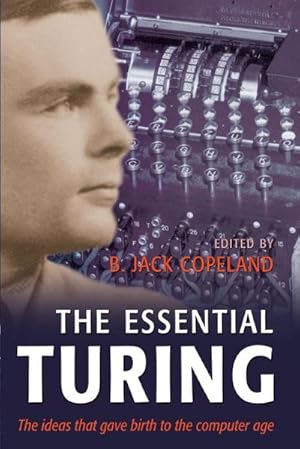Essential Turing Seminal Writings Computing by Copeland Jack (18 results)
FeedbackSearch filters
Product Type
- All Product Types
- Books (18)
- Magazines & Periodicals (No further results match this refinement)
- Comics (No further results match this refinement)
- Sheet Music (No further results match this refinement)
- Art, Prints & Posters (No further results match this refinement)
- Photographs (No further results match this refinement)
- Maps (No further results match this refinement)
- Manuscripts & Paper Collectibles (No further results match this refinement)
Condition
Binding
Collectible Attributes
- First Edition (1)
- Signed (No further results match this refinement)
- Dust Jacket (No further results match this refinement)
- Seller-Supplied Images (9)
- Not Print on Demand (17)
Language (2)
Free Shipping
Seller Location
Seller Rating
-
The Essential Turing: Seminal Writings in Computing, Logic, Philosophy, Artificial Intelligence, and Artificial Life plus The Secrets of Enigma
Published by Oxford University Press, 2004
ISBN 10: 0198250800 ISBN 13: 9780198250807
Language: English
Seller: High Street Books, New Mills, United Kingdom
Paperback. Condition: Very Good. Light wear to the covers. Shipped from the UK in recyclable card packaging.
-
The Essential Turing: Seminal Writings in Computing, Logic, Philosophy, Artificial Intelligence, and Artificial Life plus The Secrets of Enigma
Published by Oxford University Press, USA 2004-11-18, 2004
ISBN 10: 0198250800 ISBN 13: 9780198250807
Language: English
Seller: Chiron Media, Wallingford, United Kingdom
Paperback. Condition: New.
-
Essential Turing : Seminal Writings in Computing, Logic, Philosophy, Artificial Intellegence, And Artificial Life; Plus The Secrets Of Enigma
Seller: GreatBookPricesUK, Woodford Green, United Kingdom
£ 32.29
Convert currencyFree shipping within United KingdomQuantity: Over 20 available
Add to basketCondition: New.
-
The Essential Turing: Seminal Writings in Computing, Logic, Philosophy, Artificial Intelligence, and Artificial Life plus The Secrets of Enigma
Seller: Ria Christie Collections, Uxbridge, United Kingdom
£ 34.18
Convert currencyFree shipping within United KingdomQuantity: Over 20 available
Add to basketCondition: New. In.
-
Essential Turing : Seminal Writings in Computing, Logic, Philosophy, Artificial Intellegence, And Artificial Life; Plus The Secrets Of Enigma
Seller: GreatBookPricesUK, Woodford Green, United Kingdom
£ 37.19
Convert currencyFree shipping within United KingdomQuantity: Over 20 available
Add to basketCondition: As New. Unread book in perfect condition.
-
The Essential Turing: Seminal Writings in Computing Logic Philosophy Artificial Intelligence and Artificial Life plus The Secrets of Enigma
Published by Oxford University Press USA, 2004
Seller: crealivres, La fontennelle, France
First Edition
£ 15.21
Convert currency£ 4.34 shipping from France to United KingdomQuantity: 1 available
Add to basketCondition: Very Good. Envoi rapide Très bon état proche du neuf. in8. 2004. Broché. 622 pages. Very Good.
-
The Essential Turing Seminal Writings in Computing, Logic, Philosophy, Artificial Intelligence, and Artificial Life Plus the Secrets of Enigma
Published by Clarendon Press, Oxford, 2004
ISBN 10: 0198250800 ISBN 13: 9780198250807
Language: English
Seller: Haymes Bookdealers, Kingscliff, NSW, Australia
£ 22.59
Convert currency£ 25.32 shipping from Australia to United KingdomQuantity: 1 available
Add to basketPaperback. Condition: Fine. 9.18 X 6.32 X 1.36 inches; 622 pages.
-
The Essential Turing: Seminal Writings in Computing, Logic, Philosophy, Artificial Intelligence, and Artificial Life Plus the Secrets of Eni (Paperback or Softback)
Published by Oxford University Press (UK) 6/24/2013, 2013
ISBN 10: 0198250800 ISBN 13: 9780198250807
Language: English
Seller: BargainBookStores, Grand Rapids, MI, U.S.A.
£ 42.04
Convert currency£ 8.56 shipping from U.S.A. to United KingdomQuantity: 5 available
Add to basketPaperback or Softback. Condition: New. The Essential Turing: Seminal Writings in Computing, Logic, Philosophy, Artificial Intelligence, and Artificial Life Plus the Secrets of Eni 2.05. Book.
-
Essential Turing : Seminal Writings in Computing, Logic, Philosophy, Artificial Intellegence, And Artificial Life; Plus The Secrets Of Enigma
Seller: GreatBookPrices, Columbia, MD, U.S.A.
£ 37.14
Convert currency£ 14.89 shipping from U.S.A. to United KingdomQuantity: Over 20 available
Add to basketCondition: New.
-
Essential Turing : Seminal Writings in Computing, Logic, Philosophy, Artificial Intellegence, And Artificial Life; Plus The Secrets Of Enigma
Seller: GreatBookPrices, Columbia, MD, U.S.A.
£ 38.14
Convert currency£ 14.89 shipping from U.S.A. to United KingdomQuantity: 5 available
Add to basketCondition: As New. Unread book in perfect condition.
-
The Essential Turing; Seminal Writings in Computing, Logic, Philosophy, Artificial Intelligence, and Artificial Life plus The Secrets of Enigma
Published by Clarendon Press Oxford, 2004
ISBN 10: 0198250800 ISBN 13: 9780198250807
Language: English
Seller: Midway Book Store (ABAA), St. Paul, MN, U.S.A.
£ 23.01
Convert currency£ 33.51 shipping from U.S.A. to United KingdomQuantity: 1 available
Add to basketPaperback. Condition: Very Good. 23.5 x 15.5 cm. 613pp. Paperback copy. Light edgewear.
-
The Essential Turing: Seminal Writings in Computing, Logic, Philosophy, Artificial Intellegence, And Artificial Life; Plus The Secrets Of Enigma
Seller: Revaluation Books, Exeter, United Kingdom
Paperback. Condition: Brand New. 622 pages. 9.25x6.25x1.50 inches. In Stock.
-
The Essential Turing: Seminal Writings in Computing, Logic, Philosophy, Artificial Intelligence, and Artificial Life plus The Secrets of Enigma
Seller: Lucky's Textbooks, Dallas, TX, U.S.A.
£ 36.11
Convert currency£ 55.85 shipping from U.S.A. to United KingdomQuantity: Over 20 available
Add to basketCondition: New.
-
The Essential Turing: Seminal Writings in Computing, Logic, Philosophy, Artificial Intelligence, and Artificial Life plus The Secrets of Enigma
Seller: A1AMedia, Saint Augustine, FL, U.S.A.
£ 41.41
Convert currency£ 55.85 shipping from U.S.A. to United KingdomQuantity: 1 available
Add to basketHardcover. Condition: Fair. Lots of wear, scuffs on edges, inside good, totally readable. may require signature at delivery B.
-
The Essential Turing: Seminal Writings in Computing, Logic, Philosophy, Artificial Intelligence, and Artificial Life plus The Secrets of Enigma
Seller: BennettBooksLtd, North Las Vegas, NV, U.S.A.
£ 72.02
Convert currency£ 32.77 shipping from U.S.A. to United KingdomQuantity: 1 available
Add to basketpaperback. Condition: New. In shrink wrap. Looks like an interesting title!
-
The Essential Turing: Seminal Writings in Computing, Logic, Philosophy, Artificial Intelligence, And Artificial Life; Plus The Secrets Of Enigma
Seller: Revaluation Books, Exeter, United Kingdom
Hardcover. Condition: Brand New. illustrated edition. 600 pages. 9.50x6.50x1.75 inches. In Stock.
-
The Essential Turing: Seminal Writings in Computing, Logic, Philosophy, Artificial Intelligence, and Artificial Life plus The Secrets of Enigma
Seller: Toscana Books, AUSTIN, TX, U.S.A.
£ 203.53
Convert currency£ 22.34 shipping from U.S.A. to United KingdomQuantity: 1 available
Add to basketHardcover. Condition: new. Excellent Condition.Excels in customer satisfaction, prompt replies, and quality checks.
-
The Essential Turing : Seminal Writings in Computing, Logic, Philosophy, Artificial Intelligence, and Artificial Life Plus the Secrets of Eni
Published by Oxford University Press(UK), 2004
ISBN 10: 0198250800 ISBN 13: 9780198250807
Language: English
Seller: AHA-BUCH GmbH, Einbeck, Germany
£ 61.58
Convert currency£ 12.15 shipping from Germany to United KingdomQuantity: 1 available
Add to basketTaschenbuch. Condition: Neu. nach der Bestellung gedruckt Neuware - Printed after ordering - Alan Turing, pioneer of computing and WWII codebreaker, is one of the most important and influential thinkers of the twentieth century. In this volume for the first time his key writings are made available to a broad, non-specialist readership. They make fascinating reading both in their own right and for their historic significance: contemporary computational theory, cognitive science, artificial intelligence, and artificial life all spring from this ground-breakingwork, which is also rich in philosophical and logical insight. An introduction by leading Turing expert Jack Copeland provides the background and guides the reader through the selection.About Alan TuringAlan Turing FRS OBE, (1912-1954) studied mathematics at King's College, Cambridge. He was elected a Fellow of King's in March 1935, at the age of only 22. In the same year he invented the abstract computing machines - now known simply as Turing machines - on which all subsequent stored-program digital computers are modelled.During 1936-1938 Turing continued his studies, now at Princeton University. He completed a PhD in mathematical logic, analysing the notion of 'intuition' in mathematics and introducing the idea of oracular computation, now fundamental in mathematical recursion theory. An 'oracle' is an abstract device able to solve mathematical problems too difficult for the universal Turing machine.In the summer of 1938 Turing returned to his Fellowship at King's. When WWII started in 1939 he joined the wartime headquarters of the Government Code and Cypher School (GC&CS) at Bletchley Park, Buckinghamshire. Building on earlier work by Polish cryptanalysts, Turing contributed crucially to the design of electro-mechanical machines ('bombes') used to decipher Enigma, the code by means of which the German armed forces sought to protect their radio communications. Turing's work on theversion of Enigma used by the German navy was vital to the battle for supremacy in the North Atlantic. He also contributed to the attack on the cyphers known as 'Fish'. Based on binary teleprinter code, Fish was used during the latter part of the war in preference to morse-based Enigma for the encryption ofhigh-level signals, for example messages from Hitler and other members of the German High Command. It is estimated that the work of GC&CS shortened the war in Europe by at least two years. Turing received the Order of the British Empire for the part he played.In 1945, the war over, Turing was recruited to the National Physical Laboratory (NPL) in London, his brief to design and develop an electronic computer - a concrete form of the universal Turing machine. Turing's report setting out his design for the Automatic Computing Engine (ACE) was the first relatively complete specification of an electronic stored-program general-purpose digital computer. Delays beyond Turing's control resulted in NPL's losing the race to build the world's first workingelectronic stored-program digital computer - an honour that went to the Royal Society Computing Machine Laboratory at Manchester University, in June 1948. Discouraged by the delays at NPL, Turing took up the Deputy Directorship of the Royal Society Computing Machine Laboratory in that year.Turing was a founding father of modern cognitive science and a leading early exponent of the hypothesis that the human brain is in large part a digital computing machine, theorising that the cortex at birth is an 'unorganised machine' which through 'training' becomes organised 'into a universal machine or something like it'. He also pioneered Artificial Intelligence.Turing spent the rest of his short career at Manchester University, being appointed to a specially created Readership in the Theory of Computing in May 1953. He was elected a Fellow of the Royal Society of London in March 1951 (a high honour).




